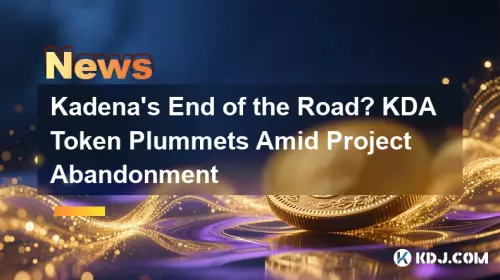 |
|
 |
|
 |
|
 |
|
 |
|
 |
|
 |
|
 |
|
 |
|
 |
|
 |
|
 |
|
 |
|
 |
|
 |
|
Cryptocurrency News Articles
Real-World Assets Tokenized: Unlocking Web3 and Institutional Investment Potential
Apr 04, 2024 at 08:35 pm
In the latest episode of Cointelegraph's Hashing It Out podcast, host Elisha Owusu Akyaw sits down with John Mullin, CEO of Mantra Chain, to explore the complexities of real-world asset (RWA) tokenization. Mullin delves into the hype surrounding RWA tokenization, its potential implications for the financial world, and the challenges that come with integrating technology and legal frameworks to create truly transferable tokens that reflect the rights and obligations of real-world assets.

Tokenization of Real-World Assets: Unlocking the Potential for Web3 and Institutional Investments
In the heart of Cointelegraph's sizzling "Hashing It Out" podcast, host Elisha Owusu Akyaw engages in an in-depth exploration of real-world asset (RWA) tokenization with John Mullin, the CEO of Mantra Chain. Mullin deftly uncovers the hype surrounding this transformative technology, unveils its practical implications for businesses, and elucidates the challenges confronting this burgeoning field.
Mullin unravels the significance of tokenization as a catalyst for widespread Web3 adoption globally. By bridging the divide between the digital and physical realms, tokenization empowers institutional investors to seamlessly participate in the decentralized finance (DeFi) ecosystem. Mullin emphasizes the crucial role of regulatory frameworks in shaping the development of the RWA space and their profound impact on Web3 initiatives.
Mullin traces the roots of the excitement surrounding real-world asset tokenization to the prominence of security token offerings (STOs) during the 2018-2019 cycle. He attributes the resurgence of RWA tokenization to heightened institutional interest and the industry's evolving approaches to regulatory complexities that previously hindered the STO sector.
Mullin advocates for a nuanced approach when considering the suitability of all assets for tokenization. While virtually anything can be tokenized, the question of whether a token conveys real-world rights presents a distinct challenge. To create a truly transferable token, projects must fuse technology and token development with real-world ownership, corporate actions, and legal standing. This intricate integration enables projects to accurately reflect and bestow the transferrable legal rights of the real-world asset in token form.
Mullin acknowledges the hurdles posed by the unique regulatory landscape governing each asset class, which varies across jurisdictions. Depending on the location of a company's operations, it must navigate a complex array of considerations, making the RWA market both a daunting and rewarding space for innovators.
Mullin boldly declares his belief in the ubiquity of tokenization in the distant future, envisioning a world where everything will be tokenized and brought on-chain. He draws a striking parallel between Web2's mission of connecting the world to the internet and Web3's transformative potential to bring the world onto the blockchain.
Mullin anticipates that the tokenization of real-world assets will attract an unprecedented surge in institutional demand, granting them access to on-chain investments without venturing into unfamiliar and volatile asset classes prevalent in DeFi.
For a comprehensive analysis of John Mullin's insights, tune into the captivating episode of "Hashing It Out" on Spotify, Apple Podcasts, or TuneIn. Embark on a thought-provoking journey through the evolving landscape of RWA tokenization, its impact on Web3 adoption, and its implications for institutional investing. Dive into Cointelegraph's extensive catalog of Web3 podcasts for further exploration of this rapidly evolving technological frontier.
Disclaimer:info@kdj.com
The information provided is not trading advice. kdj.com does not assume any responsibility for any investments made based on the information provided in this article. Cryptocurrencies are highly volatile and it is highly recommended that you invest with caution after thorough research!
If you believe that the content used on this website infringes your copyright, please contact us immediately (info@kdj.com) and we will delete it promptly.






























































